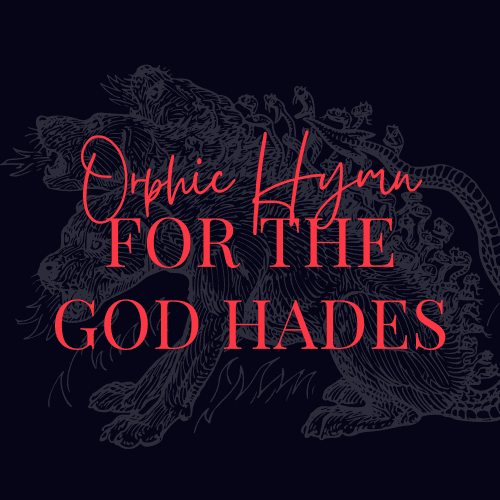Please note that posts on this site may contain affiliate links
Hades is the Greek God of the Underworld who was also known as Pluto. He was the ruler of the underworld and he had power over the dead. He was the son of Cronus and Rhea and brother of Zeus. His mother was Rhea. He married Persephone.
The offerings to Hades are food that would be considered fit for a king. In Greek mythology, Hades was lord of the underworld, so it makes sense that he would want to eat well. The offerings include wine, bread, cheese, meat, fish, fruit, vegetables, nuts, and seeds. In particular, offerings of red wine, mint, honey, and garlic are appropriate for Hades.
When you offer something to Hades, you are creating a bond between you and this god. You could use this as an opportunity to ask for help with your situation or to give thanks for all the things in life that you do have.

Why Offer Sacrifices To Hades
While this may seem strange, you can give offerings to Hades as part of fertility rights. It’s also appropriate to leave offerings to the Lord of the Underworld when working with the dead, or on liminal holidays like Beltane and Samhain.
Hades is a chthonic deity. Chthonic means “underground” or “subterranean.” As such, his domain is dark and mysterious, it is in fact the frightful underworld. Because he rules the dead, he is associated with death and decay. However, there is no reason to fear him because he does not cause harm to humans. He merely rules over their shades.
When you do ancestor work, you invade the realm of Hades. Because of this, it’s a good idea to give him offerings and thank him for allowing the shades of your dead ancestors to work with you.
Other reasons to honor Hades is to ward off evil spirits, to avoid a violent death, and when you’re honoring the death and rebirth cycle inherent in the story of Persephone and her husband Hades.
I also give offerings to Hades any time I go to funeral services, to hopefully ease the soul of the recently dead.

What Was Traditionally Given To Hades
Traditionally, Hades was worshipped in a kneeling pose. The ancients would pound on the ground with their hands. Hades was also thought to turn a deaf ear to prayers and praise.
There were few places of worship dedicated to Hades. The city of Elis had some temples to him, but his worship was more private in other parts of the ancient world.
The priest was the only person allowed in the sacred temples of Hades. They were only opened once a year, and other worshippers had to remain outside.
Traditionally, Hades may have had human sacrifice dedicated to him, a practice he shares with the goddess Artemis. When giving offerings, people would avert their eyes from any statues of Hades.
Like other chthonic deities, black animals were sacrificed to him as well.
There was one festival held for Hades. It was only done every 100 years or so, and it was called the Secular Games.
At the Nekromanteion of Hades in Ephyra, those who had come to talk to their dead loved ones would be kept in rooms designed for sensory deprivation and were probably given food with ingredients meant to have hallucinogenic properties.
The Nekromanteion was said to have been full of treasures and gifts from supplicants visiting. Coins, gold, and other treasures were probably left to the God of the Underworld in order to gain his favor when communicating with the dead.

What Scents Does Hades Like
If you’re offering incense, it’s hard to go wrong with dragons blood. Dragons blood is a red tree resin and is associated with chthonic deities in general.
Other scent offerings include cedarwood, myrrh, lavender, cypress, amber, mint, and jasmine. Any scents that are appropriate for underworld gods in your spiritual path will be appropriate for Pluto, too.

Food Offerings For Hades
Foods and drinks for Hades will be similar to the foods offered to any chthonic deity. While this will differ depending on your spiritual path, there are some foods that are common amongst most cultures for deities of the underworld.
These include:
- Dark red wine
- Whiskey
- Black coffee
- Black tea
- Peppermint tea
- Honey
- Dark chocolate
- Rich meats
- Sharp cheeses
- Breads or cakes
- Pomegranates
- Apples
- Mint
- Peppermint
- Poppy seeds
- Black narcissus
- Thyme
- Rosemary

Orphic Hymn To Hades
Orphic Hymn 18 to Pluton (trans. Taylor) (Greek hymns C3rd B.C. to 2nd A.D.):
“To Plouton (Pluto) [Haides]. Plouton, magnanimous, whose realms profound are fixed beneath the firm and solid ground, in the Tartarean plains remote from sight, and wrapt for ever in the depths of night. Zeus Khthonios (of the Underworld), thy sacred ear incline, and pleased accept these sacred rites divine. Earth’s keys to thee, illustrious king, belong, its secret gates unlocking, deep and strong. ‘Tis thine abundant annual fruits to bear, for needy mortals are thy constant care. To thee, great king, all sovereign earth assigned, the seat of gods and basis of mankind. Thy throne is fixed in Haides’ dismal plains, distant, unknown to the rest, where darkness reigns; where, destitute of breath, pale spectres dwell, in endless, dire, inexorable hell; and in dread Akheron (Acheron), whose depths obscure, earth’s stable roots eternally secure. O mighty Daimon, whose decision dread, the future fate determines of the dead, with Demeter’s girl [Persephone] captive, through grassy plains, drawn in a four-yoked car with loosened reins, rapt over the deep, impelled by love, you flew till Eleusinia’s city rose to view: there, in a wondrous cave obscure and deep, the sacred maid secure from search you keep, the cave of Atthis, whose wide gates display an entrance to the kingdoms void of day. Of works unseen and seen thy power alone to be the great dispending source is known. All-ruling, holy God, with glory bright, thee sacred poets and their hymns delight, propitious to thy mystics’ works incline, rejoicing come, for holy rites are thine.”
FAQs
How was Hades worshipped?
Hades was worshipped through offerings of food, drink, and incense. Ancient worshippers would often pound on the ground with their hands while kneeling to him.
What religion does Hades belong to?
Hades belongs to Greek mythology, which is a polytheistic religion that was practiced in ancient Greece. He was likely not worshipped by many people, though he is now a popular god among NeoPagans and witches.
Does Hades have a sacred animal?
Hades is often associated with the three-headed dog, Cerberus, who guards the entrance to the underworld. He is also associated with the black ram, the screech owl, and serpents.
Is Hades a friendly god?
Hades is not typically seen as a friendly god, as he is associated with death and the underworld. However, he is not considered malicious towards humans and is often worshipped for protection from evil spirits and a peaceful death. To the ancients, Hades was seen as aloof and unaffected by human affairs. Modern practitioners have noted close relationships and a warm, fatherly sort of relationship with the god.
What colors are associated with Hades?
Black and red are commonly associated with Hades, as they represent death and blood respectively.
What flowers are associated with Hades?
Black narcissus and thyme are both associated with Hades, as they are often used in offerings to chthonic deities.
What plant is associated with Hades?
Mint is associated with Hades, as it is a common offering in Greek mythology.
What smells are associated with Hades?
Dragons blood, cedarwood, myrrh, lavender, cypress, amber, mint, and jasmine are all appropriate scents to offer to Hades.
What food represents Hades?
Dark red wine, whiskey, black coffee, black tea, honey, dark chocolate, rich meats, sharp cheeses, breads or cakes, pomegranates, apples, mint, peppermint, poppy seeds, and thyme are all appropriate offerings to Hades.
Persephone altar supplies include dark candles, pomegranates, roses, and obsidian. These items should be placed in a bowl, or on a table covered with a cloth. Get these handmade supplies for your Persephone altar on Etsy. The site also has other offerings, including incense, perfumes, crystals, stones, herbs, spices, oils, and artwork that would fit a Persephone altar.
During the full moon, we call upon Hekate to assist us in clearing our past, releasing our fears, and opening ourselves to new possibilities. We ask her to help us gain clarity in our lives, to help us transform our inner worlds, and to allow us to move forward with courage and confidence.
It is said that Hekate helps us to overcome obstacles and challenges that stand in our way, and to achieve our goals. In addition to being a benevolent Goddess, she is also a fierce warrior. When we summon her, we invite her to help us take charge of our lives, to lead us into battle, and to fight for justice.
I am an eclectic witch - I've been practicing since 1974. As a student of the occult, working with astrology, tarot cards, runes, and numerology, I found that this was a very comprehensive and well written text on working with Hekate during the full moon. Highly recommended. - Gail Sager
Great read - a must have for anyone interested in working with the Goddess during the full moon! Highly recommended! - Luis Meyer



